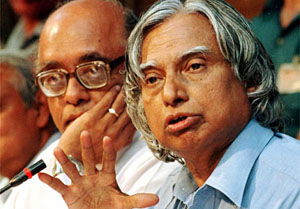New Delhi, Jul 28: Amid debate over whether Mumbai serial blasts convict Yakub Memon should be hanged, late A P J Abdul Kalam had supported abolition of capital punishment saying that as President of India, he felt pain in deciding on such cases as most of them had "social and economic bias".
Kalam had recently responded to a Law Commission consultation paper on capital punishment and was one of the few people who had supported abolition of death sentence. Most of the over 400 respondents had supported continuing with the provision of death penalty.
In his response to the paper, Kalam had said capital punishment was one of the most difficult tasks for him as President.
A two-judge bench of the Supreme Court today delivered a split verdict on a plea by Yakub Abdul Razak Memon, the lone death convict in 1993 Mumbai blasts case, seeking stay of his scheduled execution on July 30 and referred the matter to the Chief Justice to take call on it.
While Justice A R Dave dismissed his plea, Justice Kurian Joseph stayed the death warrant issued on April 30 for his execution on July 30.
Quoting from his book "Turning Points", Kalam had said "one of the more difficult tasks for me as President was to decide on the issue of confirming capital punishment awarded by courts... to my surprise... almost all cases which were pending had a social and economic bias.
"This gave me an impression that we were punishing the person who was least involved in the enmity and who did not have a direct motive for committing the crime," he had said.
The former President, however, said there was of course one case where he found that the lift operator had in fact committed the crime of raping and killing the girl without doubt. "In that case I affirmed the sentence," he had said.
He was referring to the case of Dhananjoy Chatterjee who was executed by hanging for the rape and murder of an 18-year- old girl at her apartment in Bhowanipur on 5 March, 1990.
The Commission had called a day-long meet earlier this month on death penalty to conclude the process of consultation. A final report would be submitted to the Supreme Court sometime next month based on the written submissions and the consultation.
In a consultation paper released on May 22 last year, the Law Commission had said that at this juncture, an exhaustive study on the subject would be a useful and salutary contribution to the cause of public debate on this issue.
The Commission said the study would have to address queries and concerns of courts and present an international perspective on the issue.
The Supreme Court, in Santosh Kumar Satishbhushan Bariyar vs Maharashtra and Shankar Kisanrao Khade vs Maharashtra, had suggested that the Law Commission should study the death penalty in India to "allow for an up-to-date and informed discussion and debate on the subject".





Comments
Add new comment